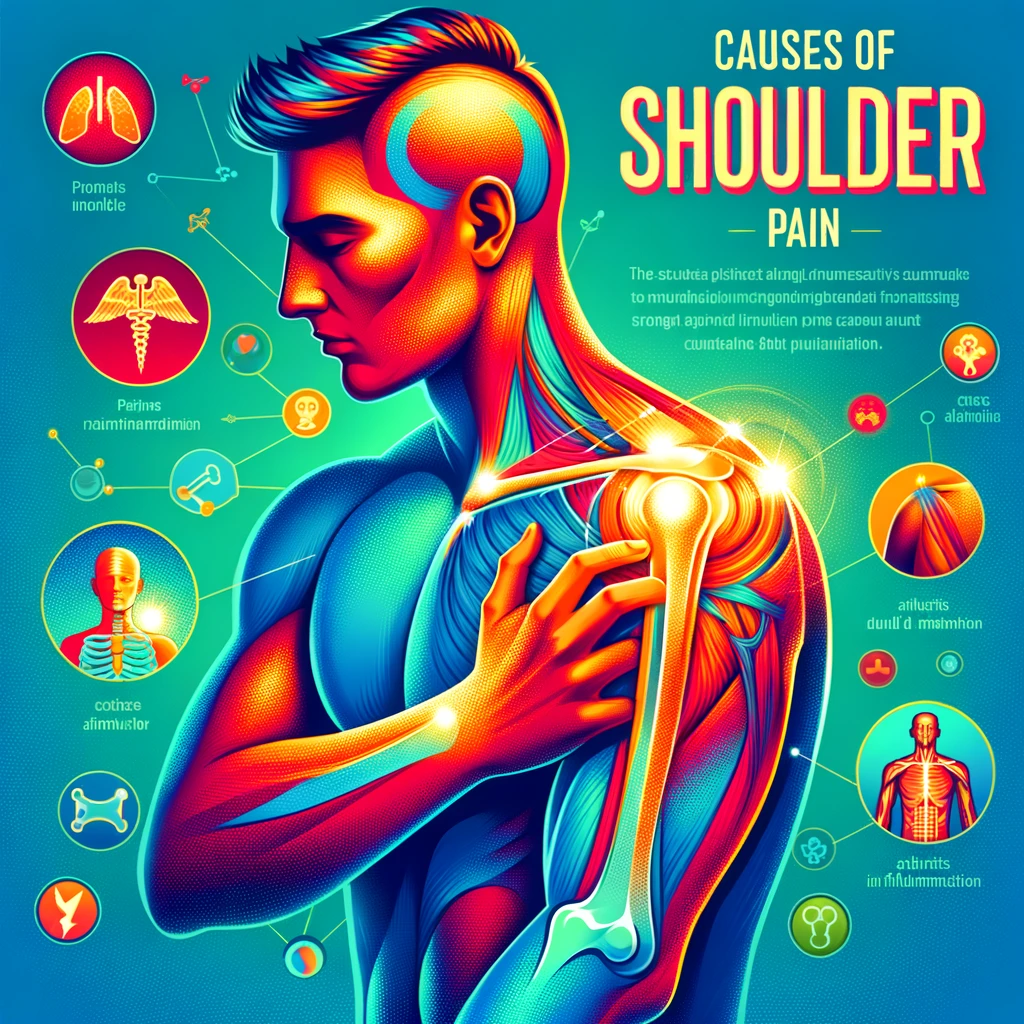
Table of Contents
Shoulder pain is a common issue that affects people of all ages and activity levels. Whether it’s a sharp pain from a recent injury or a chronic ache due to an underlying condition, shoulder pain can significantly impact your daily life. Addressing shoulder pain effectively requires understanding causes of shoulder pain and exploring various remedies. Let’s dive into the numerous ways you can alleviate shoulder pain and improve your overall well-being.
Anatomy of the Shoulder
To effectively address shoulder pain, it’s crucial to understand the shoulder’s anatomy and the types of pain you might experience. The shoulder is a complex joint made up of bones, cartilage, ligaments and tendons. Pain can arise from any of these components, manifesting as either acute or chronic discomfort.
Common Causes of Shoulder Pain
Injuries
Rotator Cuff Tears: The rotator cuff is a group of muscles and tendons that stabilize the shoulder. Tears in the rotator cuff can cause significant pain and limit movement.
Shoulder Dislocations: A dislocation occurs when the upper arm bone pops out of the shoulder socket. This can cause severe pain and instability in the shoulder.
Inflammation
Tendinitis: Inflammation of the tendons around the shoulder, often due to overuse or repetitive movements.
Bursitis: Inflammation of the bursae, the small fluid-filled sacs that cushion the shoulder joint, can cause pain and restrict movement.
Arthritis
Osteoarthritis: This type of arthritis is caused by the gradual wear and tear of cartilage in the shoulder joint.
Rheumatoid Arthritis: An autoimmune condition that causes inflammation in the joints, including the shoulders.
Overuse Syndromes
Impingement Syndrome: This occurs when the rotator cuff tendons are compressed during shoulder movements, leading to pain and inflammation.
Frozen Shoulder: Also known as adhesive capsulitis, this condition is characterized by stiffness and pain in the shoulder joint.
Less Common Causes of Shoulder Pain
Nerve Compression: Compression of the nerves around the shoulder can cause pain, numbness and tingling sensations.
Fractures: Breaks in the bones of the shoulder can result from falls, accidents or high-impact sports. These injuries often require medical intervention to heal properly.
Infections: Bacterial infections in the shoulder joint can cause severe pain and require prompt medical treatment.
Symptoms to Watch For
Recognizing the symptoms associated with shoulder pain can help identify the underlying cause. Common symptoms include:
- Pain Location: The specific area of pain can indicate the source of the problem.
- Swelling: Swelling is often a sign of injury or inflammation.
- Stiffness: Difficulty moving the shoulder joint can point to arthritis or other joint issues.
- Redness and Warmth: Signs of infection or severe inflammation.
Risk Factors
Several factors can increase the likelihood of shoulder pain, including:
Age: The risk of shoulder problems increases with age.
Activity Level: High-impact sports or sudden increases in activity can cause shoulder pain.
Previous Injuries: Past shoulder injuries can make the joint more susceptible to future problems.
Medical Conditions: Conditions like diabetes or obesity can contribute to shoulder pain.
Diagnosis of Shoulder Pain
Diagnosing shoulder pain typically involves:
Physical Examination: A doctor will assess the shoulder’s range of motion and look for signs of injury.
Imaging Tests: X-rays, MRIs, or CT scans can provide detailed images of the shoulder’s structure.
Lab Tests: Blood tests can identify infections or autoimmune conditions like rheumatoid arthritis.
Treatment Options
Treatment varies depending on the cause and severity of the pain:
Medications: Pain relievers and anti-inflammatory drugs can help manage symptoms.
Physical Therapy: Exercises to strengthen the muscles around the shoulder and improve flexibility.
Surgery: In severe cases, surgical intervention may be necessary to repair or replace damaged structures.
Lifestyle Changes: Weight management and low-impact exercise can alleviate shoulder pain and prevent further issues.
Home Remedies for Shoulder Pain
Simple home remedies can provide relief for mild shoulder pain:
R.I.C.E. Method: Rest, Ice, Compression, and Elevation can reduce swelling and pain.
Exercise and Stretching: Regular, gentle exercises can keep the shoulder joint flexible and strong.
Dietary Considerations: A diet rich in anti-inflammatory foods can help manage pain.
Preventing Shoulder Pain
Prevention is better than cure. Here are some tips to keep shoulder pain at bay:
Proper Warm-Up: Always warm up before engaging in physical activity to prepare the muscles and joints.
Strengthening Exercises: Regularly strengthening the muscles around the shoulder can provide better support.
Ergonomic Adjustments: Making ergonomic adjustments to your work environment can reduce shoulder pain. Ensure your chair and desk are at the proper height to avoid unnecessary strain.
Impact of Shoulder Pain on Daily Life
Shoulder pain can significantly affect your daily activities:
Mobility Issues: Pain can limit your ability to lift, carry or even perform simple tasks.
Psychological Effects: Chronic pain can lead to stress, anxiety and depression, impacting your overall well-being.
When to See a Doctor
It’s essential to seek medical attention if you experience:
- Severe pain that doesn’t improve with rest
- Significant swelling
- Inability to bear weight on the shoulder
- Signs of infection, such as redness and warmth
Living with Chronic Shoulder Pain
For those living with chronic shoulder pain, managing the condition is essential. This includes:
Pain Management Strategies: Regular use of pain relief methods and maintaining a healthy lifestyle.
Support Systems and Resources: Joining support groups or seeking counseling can provide emotional support and practical advice.
Conclusion
Understanding the causes of shoulder pain is crucial for effective treatment and prevention. Whether the pain is due to an injury, inflammation or an underlying condition, addressing it promptly can significantly improve your quality of life. By incorporating preventive measures, such as proper warm-ups, strengthening exercises and ergonomic adjustments, you can reduce the risk of shoulder pain. Additionally, exploring various treatment options, from home remedies to medical interventions, can provide relief and enhance shoulder health. If shoulder pain persists or worsens, seeking professional medical advice is essential to ensure proper diagnosis and management. Taking proactive steps can help you maintain healthy, pain-free shoulders and enjoy a more active lifestyle.
FAQs
What is the most common cause of shoulder pain?
Rotator cuff injuries are among the most common causes of shoulder pain. They can result from acute injuries or chronic wear and tear.
Can shoulder pain be a sign of a serious condition?
Yes, shoulder pain can sometimes indicate serious conditions like infections or severe injuries. Always consult a doctor if you have concerns.
Are there any exercises to prevent shoulder pain?
Yes, exercises like shoulder stretches and strength training can help prevent shoulder pain by keeping the muscles and tendons strong and flexible.
How long does it take for a shoulder injury to heal?
The healing time for a shoulder injury varies depending on the severity. Minor injuries might heal in a few weeks, while severe injuries could take months.
Can diet affect shoulder pain?
Yes, a diet rich in anti-inflammatory foods can help reduce shoulder pain. Foods like fish, nuts, and leafy greens are beneficial.


